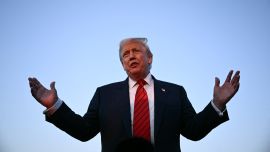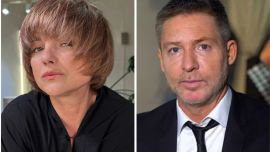Cristina Fernández de Kirchner launched a long and politically charged defence against the corruption charges she faces on Tuesday, the day after prosecutors called for the vice-president to face 12 years in jail and a lifetime ban from politics for her alleged crimes.
The vice-president, 69, is accused of leading an “illicit association” that oversaw the fraudulent awarding of contracts for public works projects in her stronghold province of Santa Cruz in Patagonia. The Senate chief denies the claims and says they are part of a campaign of judicial and political persecution that aims to remove her from politics.
In a live broadcast on social media on Tuesday, Fernández de Kirchner said that her political legacy, and Peronism as a whole, was on trial and that prosecutors had already "written the sentence" against her.
"Nothing, absolutely nothing that they have said was proven," said the Senate chief, a lawyer by trade who was president from 2007 to 2015, succeeding her late husband, Néstor Kirchner, in office. It was during those three presidential terms that the alleged graft occurred, according to prosecutors.
"It's not a trial against me, it's a trial of Peronism, of the national and popular governments," she said in a one-and-a-half-hour speech featuring excerpts from laws, press articles, emails, WhatsApp messages and accounts.
"It is 12 years [of prison time requested], the 12 years of the best government Argentina has had in these last decades," declared the vice-president. “That is why they are going to stigmatise me and condemn me. If I were born 20 times, I would do the same thing 20 times."
She added: "They want to take revenge [and] discipline the political class so that no-one dares to do the same thing twice,” declaring that “the trial began with a fiction told by the prosecutors.”
During her long exposition, Cristina Fernández de Kirchner repeatedly returned to her ‘lawfare' theory, linked the head of the court Judge Rodrigo Giménez Uriburu with the last military dictatorship, said Mauricio Macri was responsible for the situation she is going through and asserted that businessmen close to the former president were assisting the former president’s attempt to persecute her.
Cheers and jeers
Fernández de Kirchner spoke from her office at the Senate, the upper house she heads and through which she enjoys parliamentary immunity.
Even if convicted in the trial – a verdict is expected at the end of the year – she would not go to prison unless her sentence were ratified by the nation’s Supreme Court, or she loses her presumed Senate bid at the next elections at the end of 2023. She could also run for office.
Another dozen people, including businessmen allied with the Kirchner family and former government officials, are on trial alongside the vice-president and their court statements are due to last weeks.
Fernández de Kirchner decided to mount her defence on social media after her request for an extra deposition was refused on Monday. The judges said that she would be able to present her case in defence hearings, which start September 5.
Several hundred supporters cheered her arrival at the Senate on Tuesday, while others did the same as she left her home in the upmarket Buenos Aires neighbourhood of Recoleta.
Such is her divisive nature that rival groups of protesters, those for and against her, congregated outside her home on Monday night after public prosecutor Diego Luciani requested she be sentenced to 12 years in jail and barred from politics for life. City Police were forced to intervene as tensions mounted, sparking the vice-president’s ire even further.
Speaking before the court via video conference, Luciani hit out at "an authentic system of institutional corruption" which he said was "probably the biggest corruption operation the country has known."
The former president says she is a victim of “lawfare,” political and judicial persecution directed by her enemies.
‘Delaying tactic’
Fernández de Kirchner’s address was strongly criticised by opposition leaders, including PRO party chair Patricia Bullrich.
"Instead of defending herself against the accusations, she talks about something else entirely. Typical delaying tactic. It will be up to the court to decide whether what the prosecutor has said is sufficient or not,” the opposition leader told the press.
The indictment dates back to Fernández de Kirchner’s two terms as president. In the case, she is accused of running an “illicit association” that granted the awarding of public works tenders in Santa Cruz, her political birthplace, to favoured businessman Lázaro Báez. The prosecutor's office estimates that around US$1 billion was defrauded from the state.
Fernández de Kirchner has been acquitted in several cases for alleged crimes that occurred while she was president, but she still faces five trials.
On Tuesday, a number of Latin America’s left-wing former presidents, including Bolivia's Evo Morales and Dilma Rousseff of Brazil, expressed their support for Fernández de Kirchner.
"I express my unconditional solidarity with the vice-president of Argentina and president of the Argentine Senate, Cristina Fernández de Kirchner," Rousseff wrote on Twitter.
Domestic allies also supported her. Justice Minister Martín Soria was among those to criticise the court, saying they had “prevented Cristina from defending herself when the procedural code is very clear: at any time the accused can speak to defend themselves.”
Soria said that "the lack of impartiality of this court and these prosecutors was exposed" in statements to a local radio station.
CFK points finger at ‘Nicky’ Caputo
In her lengthy streamed address outlining criticisms of the ‘Vialidad’ trial, Vice-President Cristina Fernández de Kirchner pointed the finger at businessman Nicolás ‘Nicky’ Caputo, who she indirectly accused of corruption and said was linked to the arrest of ex-public works secretary José López, one of the defendants in the trial.
Fernández de Kirchner read out a series of messages between Caputo and López, who was arrested in 2016 outside a convent with bags carrying weapons and almost US$9 million in cash. She observed that another defendant at the heart of the claims, businessman Lázaro Báez, had less contact with López than Caputo.
"My surprise is that my alleged partner [in crime in the trial], Lázaro Báez, has only three messages with López. And also that Nicolás Caputo, Macri’s brother for life, had messages with López," said the former president.
"They were the owners of those US$9 million that had been paid to López, I have no doubts," she alleged.
Caputo, who runs a multinational construction firm, is well-known in political circles and is a close friend of former president Mauricio Macri, who Fernández de Kirchner says is behind the scheme to persecute her.
The opposition leader first met Caputo at the Newman School when they were aged six and has previously described his friend as a “brother for life.”
The duo have worked together in business and government, as well as at the highest level of the Boca Juniors football club, which Macri ran before entering politics.
Caputo has been a major contractor for building projects tendered by the Buenos Aires City government, which has been controlled by Macri’s PRO party for more than a decade.
– TIMES/AFP/PERFIL


























Comments